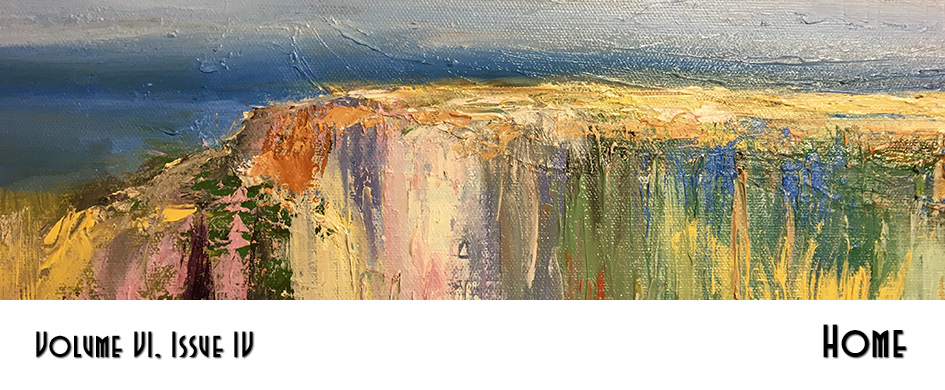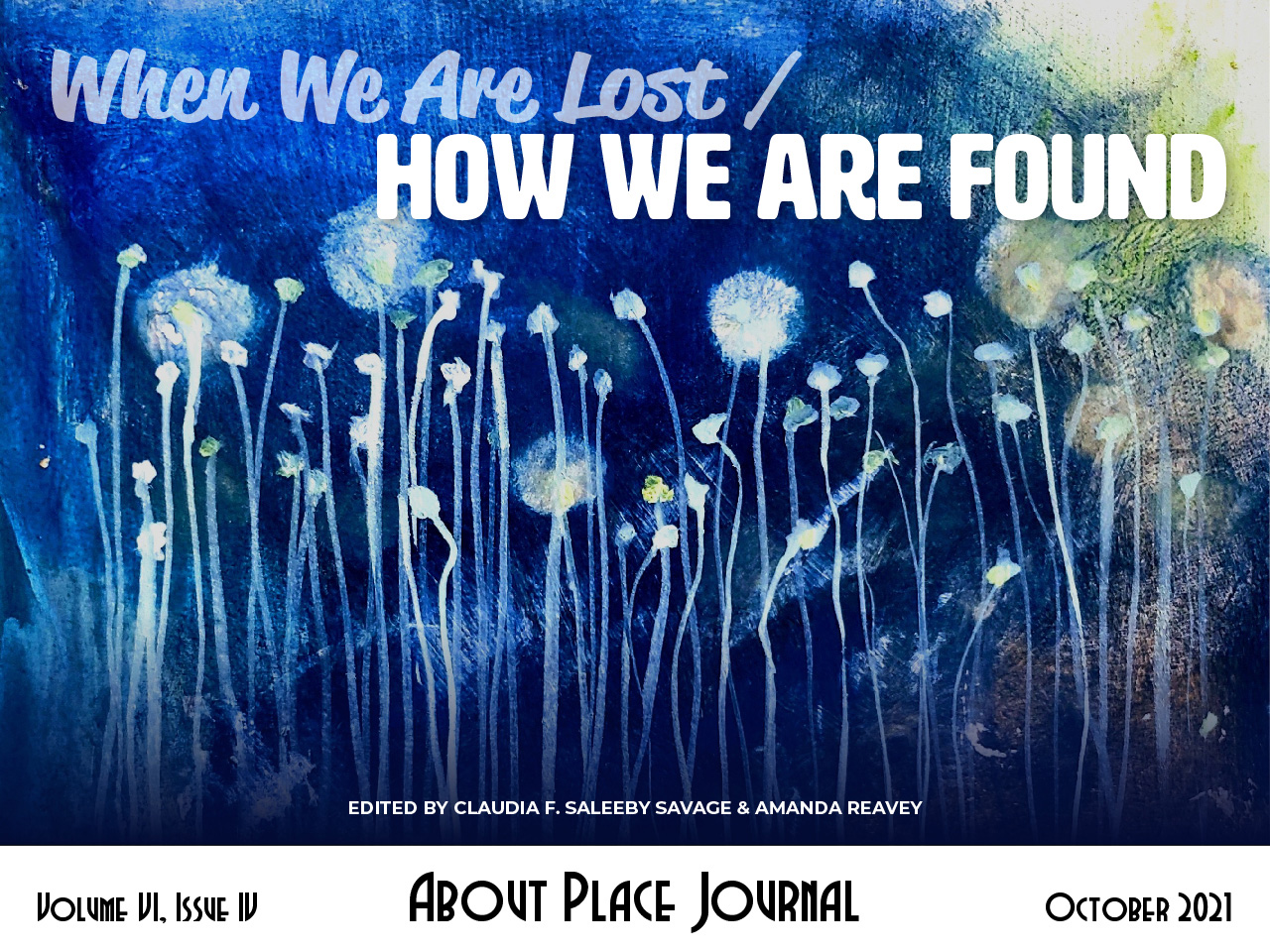On a spring day smelling of earthworms and rain, even in Boston, when the flowering crabapples at the base of the building frothed pink, James went whistling to the elevator, in his briefcase the best campaign he’d ever prepared. At his desk, he gently unpacked the color prints on paperboards, the jump drive with the slide show, the video script. His boss came in, greeted him cheerfully, reminded him of an offer he’d made, in dead of winter, when asked if he’d be willing to drive to Vermont.
Yes, he remembered; in the bleakness of winter he had promised to drive this man’s parents, someday, to some unspecified place in that distant, snowbound state, someday, when it might thaw, but not today, not when he had a presentation to make, not with such fine material, but his boss had seen that, and praising him, said that anyone could make a terrific pitch with such well‑prepared work, and that his parents were in from California for just a few days, and what with spring weather being so iffy and all, it seemed best to take advantage of it while it lasted. And so it was settled, and out James went, into the hazy sunshine, past the mocking crabapple, his work, his life, sitting on his desk for someone else to get credit for, while he, James the creator, drove a company car with somebody else’s parents in it to somewhere still half‑frozen, a place so small its name was not in the mapping program he checked for directions, so small the GPS would take him only to the town his boss had assured him was the nearest one to it.
A man’s voice spoke through the intercom to the lobby; they would come right down. James understood; no need to have the chauffeur gaze upon the riches of the boss’ apartment. He waited near the elevator, and sure enough, there they came, not three minutes later, stick figures with gray hair, bundled up all out of proportion for the weather in coats that looked fifty years out of date.
Frank and Lenore Addison, they were, he in black and she in gray, and neither with a fraction their son’s confidence or looks, but there they were, and in two minutes more, she was in the back seat, and he in the front beside James, and it was out into late rush hour and to the interstate, north.
Clumps of daffodils splashed occasional light on the median strip on this day that couldn’t decide between sun and clouds. The Addisons said nothing, gave James permission to suit himself when he asked if they’d like some music. He couldn’t, not without offending them, play what he liked, nor would he listen to the sort of sounds that would please them, not if they didn’t ask for it, so the silence continued. An hour later, as they passed through Gardner, Mrs. Addison laughed suddenly from the back seat.
“The big chair,” she said. “They still have a big chair out front of the furniture plant. Not the same one, of course, but still…”
It was a good sign, Mr. Addison agreed, and Mrs. Addison began to tell about the old days, before the war, when the furniture makers in Gardner were something to speak of, even up as far as Elliston. A few minutes later, when they crossed into Vermont, a floodgate of memories was released and the words came pouring out, first from one, then the other as the old landmarks were recognized. Changed some, yes, but not so much you couldn’t still pick them out. The mountains of course, they didn’t change; James might have guessed that, but it was depressing to think that they’d sat like that, under skies like these, boiling pewter clouds occasionally letting slip a sulky bit of sunlight, all these years, while the two laying claim to them now as home were soaking in the warmth of California.
And so it went for forty‑five minutes more, the sightings and claimings and exclaimings, until finally James could bear it no more, being there and not being there, and asked them why they had ever left in the first place.
Silence again, for long enough that he wished he’d held his tongue, then the very sort of story he hated, of a baby born and died, a daughter before the son he knew; a flood, and farming that grew harder, then impossible, followed by selling the land, then the house that all the Addisons ever in that part of Vermont had lived in, that their son would never remember or care for; and the trip west, to a hard life that had gradually become easier and finally quite good indeed. Indeed, so why return to the pain? That was not a question he would ask. But once loosed, the story would not stop so easily.
There had been letters, not many, but regular, to the neighbors who had stayed behind, then gradually, they, too, moved away, one, two, then, it seemed, all in a rush, like something had gone bad, but no one ever said, and well, no one should ask about such, if it’s not volunteered. And now, well now, they had some money put by, and thought that maybe it would be possible to buy the place back, a gift for their grandchildren, you know, a nice place for the summers, perhaps. And to see it again, where they’d been newlyweds, that would be nice, too, only hope it wouldn’t be too run down. James could see it already, peeling white paint and dark green shutters, like all the other old places let go, maybe even a little sag in the roof, a tilt to the porch with a skunk in residence below.
“We’ll need to stop for gas,” he said. “Do you want anything?”
They went to “wash up” while he watched the attendant fill the big car. “How much further to Elliston?” he asked.
“Another fifteen minutes up the road to Elliston Reservoir,” the attendant said.
“And the town?”
“What town?”
“Elliston.”
“There is no town of Elliston.”
“What do you mean?” James said. “These people come from Elliston; of course there’s a town.”
“Not for forty‑some years, there hasn’t been. Boston bought the whole thing, big eminent domain fight and all, everyone around must’ve known about it; t’whole town wound up covered with water, whole place flooded.”
“But I’ve come so far…there must be something,” James said.
“Usta be able to see the church steeple on calm days, but that’s prob’ly rotted out by now.”
James handed over the company credit card, considered that his boss had been born in a town that had drowned, wondered whether he knew or cared, thought it grim justice either way. Watching the Addisons get back into the car, though, he realized he did not want to be with them when they found out; they might cry or carry on, embarrass him, make the trip back unbearable.
“How about some lunch?” he asked. “It’s going on one; we could get a little something, then go on.”
But no, they were too close, couldn’t they just go on and get something on the way back? After all, his working day was to end at five, and already they would be back after then.
“That’s true,” James said. “And I’ve just remembered— I have an appointment I absolutely can’t break at six. If we turned around now, I could just about make it.”
“Young man, you made a promise to my son, and you will keep it,” Mr. Addison said, and so it was settled.
James followed the main road, turned when Mr. Addison directed him to, said nothing when Mrs. Addison commented that there should be a sign any minute, turned when another road was indicated. At the crest of a hill, he could see the steely glint of water through the branches of the barely budded trees.
“This doesn’t seem right,” from the back seat.
“The turns were right,” from the front, then silence.
“Should I turn around?” James asked, finally.
“No.”
He drove on when the pavement ended, when the dirt became rutted and pocked with ice‑slicked puddles. He drove until the road ended a short distance from water’s edge, then he stopped, with the engine running, and waited.
“My Lord, it’s all gone,” she said softly. “No wonder everyone left. And no one told, no one told.” She stopped, her voice shaking, but when she spoke again, it was much steadier. “But you knew. You knew! Why didn’t you say something?”
James did not reply. What did it matter, whether he knew, or when? Others had known and never seen fit to say anything. He had been trapped, forced into this, and no matter how it turned out, he would have no control over anything
“Shut the engine,” from beside him. They got out, in winter coats last worn in this place, and walked, not far, to stand behind the trees that grew to the edge, where James could not see them.
Here and there, James thought he could see branches sticking up above the water. He imagined this water, coming out of the tap in his apartment, murky gray with bark, peeled paint, cans of varnish left in abandoned cellars. This water, his morning coffee, sitting under a sky swirled slate and deeper, under the gaze of stick figures dressed in black and gray: this water, and his mouth was dry.


